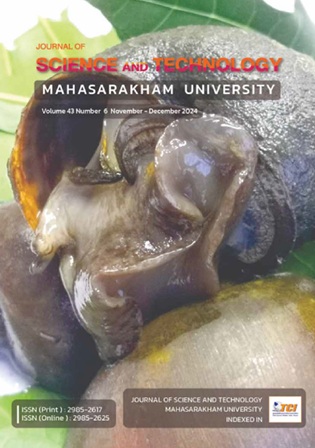Generating synthetic labels for satellite image classification through self-supervised representation learning
Main Article Content
Abstract
Supervised deep learning techniques are state-of-the-art methods in satellite image analysis; however, this technique requires a large, labeled dataset. The acquisition of such datasets is expensive in terms of both manpower and resources. Conversely, there is an abundance of raw satellite images, available for both commercial and academic purposes. To address the scarcity of labeled data in satellite image classification, this study presents a novel method to utilize these unlabeled data. It uses self-supervised learning technique to create synthetic labels that act as a training dataset for supervised learning models. Experimental results show that models trained with synthetic labels perform comparably to those trained with real labels, using 9 times fewer labeled data, achieving 75% accuracy on the palm oil plantation dataset and 86% accuracy on the Amazon rainforest dataset. Additionally, the process of generating synthetic labels yields versatile and knowledge-transferable visual representation vectors.
Article Details
References
Benjamin Goldenberg, Burak Uzkent, Christian Clough, Dennis Funke, Deven Desai, grischa, Jesus MartinezManso, Kat Scott, Meg Risdal, Mike Ryan, Pete, Rachel Holm, Ramesh Nair, Sean Herron, Tony Stafford, Wendy Kan. (2017). Planet: Understanding the Amazon from Space. Kaggle. https://kaggle.com/competitions/planet-understandingthe-amazon-from-space
Chapelle, O., Schoellkopf, B., & Zien, A. (2006). Semi-supervised learning (adaptive computation and machine learning). The MIT Press.
Chen, T., Kornblith, S., Norouzi, M., & Hinton, G. (2020). A simple framework for contrastive learning of visual representations. arXiv preprint arXiv:2002.05709.
Chen, T., Kornblith, S., Swersky, K., Norouzi, M., & Hinton, G. (2020). Big self-supervised models are strong semi-supervised learners. arXiv preprint arXiv:2006.10029.
Cortes, C., & Vapnik, V. (1995). Support-vector networks. Mach. Learn., 20(3), 273-297. doi: 10.1007/BF00994018
Demir, I., Koperski, K., Lindenbaum, D., Pang, G., Huang, J., Basu, S., ... Raska, R. (2018). Deepglobe 2018: A challenge to parse the earth through satellite images. In 2018 ieee/cvf conference on computer vision and pattern recognition workshops (cvprw) (pp. 172-17209). doi: 10.1109/CVPRW.2018.00031
D.R., S., Shenoy, P. D., & R., V. K. (2017, Mar). Remote sensing satellite image processing techniques for image classification: A comprehensive survey. IJCA, 161(11), 24-37. doi: 10.5120/ijca2017913306
Emily Liu, Judy Logan, kitushan, Meredith Lee, phoebeliuF8, QMirsharif, Sam Roy, Sherrie Wang, Valerie, Vani M, Varsha Venkatesh, WiDS Datathon. (2019). WiDS Datathon 2019. Kaggle. https://kaggle.com/competitions/widsdatathon2019
Giorgiani do Nascimento, R., & Viana, F. (2020). Satellite image classification and segmentation with transfer learning. In Aiaa scitech 2020 forum (p. 1864). doi:10.2514/6.2020-1864
Hadsell, R., Chopra, S., & LeCun, Y. (2006). Dimensionality reduction by learning an invariant mapping. In Cvpr (Vol. 2, pp. 1735-1742). doi: 10.1109/CVPR.2006.100
He, K., Zhang, X., Ren, S., & Sun, J. (2016). Deep residual learning for image recognition. In Proceedings of the ieee conference on cvpr (pp. 770-778).
Heupel, K., Spengler, D., & Itzerott, S. (2018). A progressive crop-type classification using multitemporal remote sensing data and phenological information. PFG-JPhotogramm Rem, 86(2), 53-69. doi: 10.1007/s41064-018-0050-7
Hinton, G., Vinyals, O., & Dean, J. (2015). Distilling the knowledge in a neural network. arXiv preprint arXiv:1503.02531.
Jing, L., & Tian, Y. (2020). Self-supervised visual feature learning with deep neural networks: A survey. IEEETPAMI, 1-1. doi: 10.1109/TPAMI.2020.2992393
Kussul, N., Lavreniuk, M., Skakun, S., & Shelestov, A. (2017). Deep learning classification of land cover and crop types using remote sensing data. IEEEGeosci Remote S, 14(5), 778-782. doi: 10.1109/LGRS.2017.2681128
Russakovsky, O., Deng, J., Su, H., Krause, J., Satheesh, S., Ma, S., ... Fei-Fei, L. (2015). Imagenet large scale visual recognition challenge. IJCV, 115(3), 211-252. doi: 10.1007/s11263-015-0816-y
Simonyan, K., & Zisserman, A. (2014). Very deep convolutional networks for large-scale image recognition. arXiv preprint arXiv:1409.1556.
van der Maaten, L., & Hinton, G. (2008). Visualizing data using t-sne. Journal of machine learning research, 9(Nov), 2579-2605.
van Engelen, J., & Hoos, H. (2020, feb). A survey on semi-supervised learning. Mach. Learn., 109(2), 373-440. doi: 10.1007/s10994-019-05855-6
Zhu, X. (2005). Semi-supervised learning literature survey (Tech. Rep.). University of Wisconsin-Madison Department of Computer Sciences.


